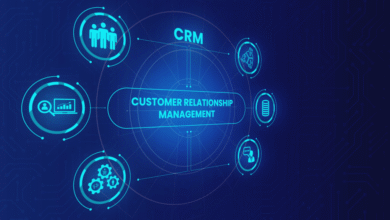Top 6 Strategies Used by Enterprise SEO Services to Improve Search Rankings

In today’s fast-paced digital landscape, having a strong online presence isn’t just a competitive advantage, it’s a necessity. Search engines are the gateway through which customers find businesses, products, and services. Whether you’re a small startup or a large corporation, appearing at the top of search results can significantly impact brand visibility and revenue. This is especially true for large organizations managing multiple websites or complex platforms. That’s where enterprise SEO services come into play. These specialized services focus on scaling SEO strategies to meet the needs of businesses operating on a national or global level.
In this blog post, we’ll explore six proven strategies that enterprise SEO experts use to improve search rankings. By understanding these techniques, you’ll gain valuable insights into how large-scale SEO campaigns work and how they can be applied to your own business to boost visibility and drive organic traffic.
1. Conducting Comprehensive Technical SEO Audits
Before any SEO strategy can be implemented, a deep understanding of the website’s technical health is essential. Enterprise SEO services often begin with a thorough technical audit to identify issues that might prevent search engines from crawling or indexing pages effectively.
Key Focus Areas in Technical SEO:
- Site Architecture: Large websites often have hundreds or even thousands of pages. Ensuring a clean, logical site structure helps both search engines and users navigate seamlessly.
- Crawlability and Indexing: Tools like Screaming Frog or Google Search Console are used to detect broken links, duplicate content, or blocked resources.
- Website Speed: A slow-loading site can hurt rankings and user experience. Optimizing images, leveraging caching, and using content delivery networks (CDNs) are common fixes.
- Mobile Optimization: With mobile-first indexing, ensuring the site is fully responsive is no longer optional.
Example: Consider a large e-commerce brand with multiple product categories and thousands of product pages. If the site has duplicate product descriptions or poorly structured URLs, it can confuse search engines, leading to lower rankings. A technical audit would identify these issues and provide solutions, such as canonical tags and optimized URL structures.
2. Building a Scalable Content Strategy
Content is the backbone of any SEO campaign. For enterprises, creating a scalable content strategy is critical because they must consistently produce high-quality, relevant content across multiple channels.
4 Best Practices for Content Creation:
- Focus on User Intent: Understanding what users are searching for and creating content that meets those needs is key.
- Create Pillar Pages and Topic Clusters: Organize content around central themes to improve topical authority.
- Repurpose Existing Content: Turn blog posts into infographics, videos, or downloadable guides to reach different audience segments.
- Leverage Data and Insights: Use analytics tools to track performance and identify content gaps.
Example: A company offering software development consulting might create a series of blogs, whitepapers, and case studies covering topics like agile methodologies, project management tips, and emerging technologies. By targeting relevant keywords, they can position themselves as industry experts while boosting search engine rankings.
3. Implementing Advanced Keyword Research
Keyword research forms the foundation of every successful SEO strategy. For enterprises, this process goes beyond identifying a handful of keywords. It involves a data-driven approach to uncover opportunities across multiple markets, languages, and demographics.
Techniques for Effective Keyword Research:
- Segment by Buyer Journey: Identify keywords for every stage, from awareness to decision-making.
- Use AI and Automation Tools: Platforms like SEMrush or Ahrefs help analyze competitor keywords and emerging trends.
- Long-Tail Keywords: Targeting specific, niche keywords can drive highly qualified traffic.
- Localized Keyword Research: For global enterprises, localizing keywords ensures relevance in different regions.
Example: A multinational retailer may use localized keyword research to tailor product descriptions for different countries. For instance, a “sweater” in the U.S. might be referred to as a “jumper” in the U.K. Adapting to these variations can significantly improve search visibility in local markets.
4. Leveraging Data Analytics for Decision-Making
Data is at the heart of enterprise SEO. With massive amounts of data available, understanding how to interpret and apply it is crucial for success.
Areas Where Analytics Drive SEO:
- Traffic and Engagement Metrics: Identify which pages perform well and which need improvement.
- Conversion Tracking: Understand how organic traffic translates into leads or sales.
- A/B Testing: Test different meta titles, descriptions, or layouts to see which performs better.
- Predictive Analytics: Use machine learning to forecast trends and adapt strategies proactively.
Example: If a business notices a spike in organic traffic to a blog post about “cloud-based software solutions,” they can use this insight to create additional related content, such as guides, tutorials, or product pages. This approach helps capitalize on growing interest while boosting search rankings.
5. Developing a Strong Backlink Profile
Backlinks remain one of the most influential ranking factors in SEO. Enterprise-level businesses need a comprehensive link-building strategy that focuses on quality over quantity.
Effective Link-Building Tactics:
- Create Shareable Content: High-quality resources like research reports or infographics naturally attract backlinks.
- Outreach Campaigns: Partner with influencers, bloggers, and industry publications to secure relevant backlinks.
- Monitor Toxic Links: Regularly check for spammy backlinks that could harm rankings and disavow them when necessary.
- Leverage PR Opportunities: Press releases and newsworthy announcements can generate authoritative links.
Example: When a tech company launches a groundbreaking tool, they can pitch the story to leading tech publications. As these outlets cover the launch, the company gains high-quality backlinks that strengthen its domain authority and improve search visibility.
6. Scaling SEO with Automation and AI
Managing SEO for large websites manually can be overwhelming. This is why many enterprise SEO services leverage automation and artificial intelligence to streamline processes and improve efficiency.
Benefits of Automation in SEO:
- Automated Reporting: Save time by generating real-time SEO performance reports.
- AI-Driven Insights: Predict search trends and user behavior to stay ahead of competitors.
- Automated Content Optimization: Tools can suggest keyword placements, meta descriptions, and internal linking structures.
- Bulk Updates: Implement site-wide changes quickly, such as updating thousands of meta tags or redirects.
Example: An enterprise-level travel website might use AI tools to automatically optimize destination pages based on search trends. For instance, if there’s a sudden spike in interest for “adventure tourism,” the tool can adjust content and keywords in real-time to capture that traffic.
Conclusion: Bringing It All Together
Improving search rankings for large businesses requires more than just basic SEO tactics. It demands a comprehensive, data-driven approach tailored to the complexities of enterprise-level websites. From conducting technical audits to building a scalable content strategy and leveraging automation, these six strategies form the foundation of a successful enterprise SEO campaign.
As businesses grow and compete in increasingly crowded markets, understanding and applying these strategies becomes even more critical. Whether you’re part of a marketing team or seeking external expertise, the key is to focus on creating value for users while staying aligned with search engine best practices. By doing so, you’ll not only boost your search visibility but also build long-term authority and trust in your industry.
Ultimately, SEO isn’t a one-time effort, it’s an ongoing process of learning, adapting, and evolving. By following these proven strategies, you’ll be well on your way to improving your rankings and achieving sustainable digital growth.



